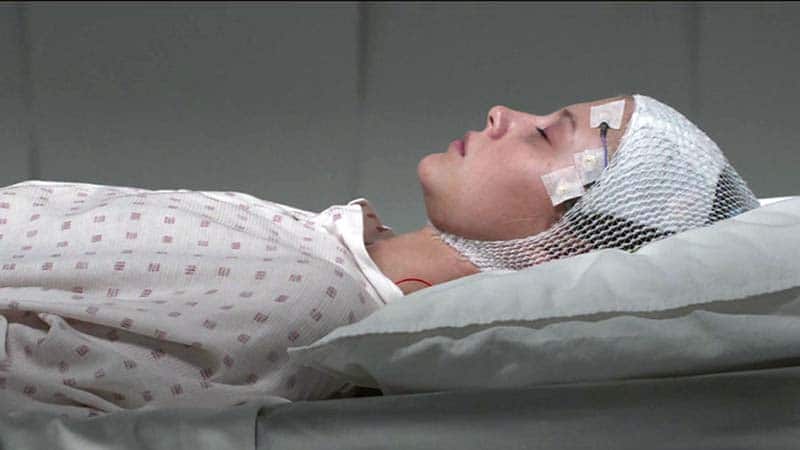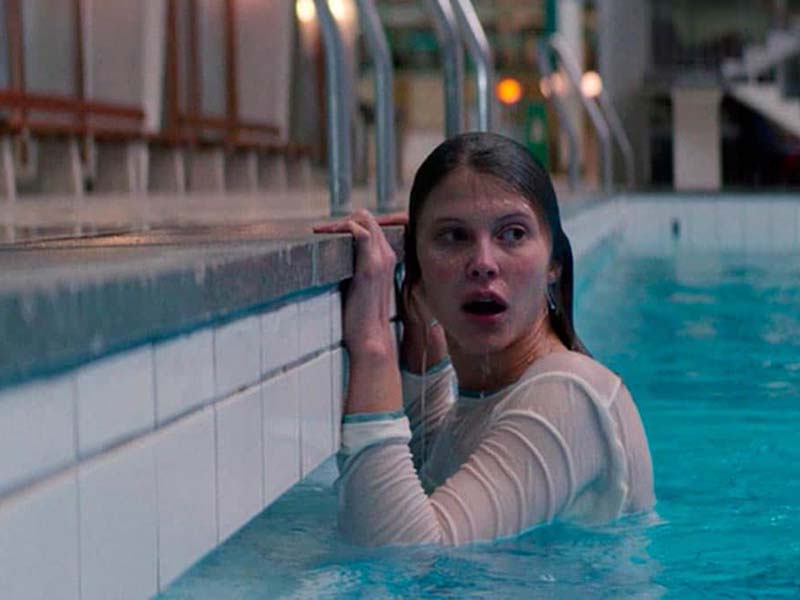The Review (Spoiler Free)
“Thelma,” directed by Joachim Trier, is a compelling narrative that weaves together elements of mystery, thriller, and horror into a seamless tapestry that explores the depths of human emotion and the complexities of personal identity. The film follows the eponymous character, Thelma, portrayed with a haunting vulnerability by Eili Harboe, as she embarks on her journey as a freshman at a university in Oslo, Norway.
The opening scene sets a chilling precedent, with a father and daughter in a snow-laden landscape, where a moment of potential violence leaves an indelible mark on the narrative. This scene is emblematic of the film’s ability to create a pervasive sense of unease that lingers throughout the story, echoing the internal turmoil of its protagonist.
Thelma’s sheltered upbringing under the watchful eye of her devout Christian parents has left her ill-prepared for the freedoms and experiences of college life. Her isolation and naivety are palpable as she navigates this new world, and her interactions with Anja, played by Kaya Wilkins, introduce a tumultuous mix of desire and confusion. The film deftly handles Thelma’s sexual awakening with sensitivity and nuance, avoiding clichés and presenting a raw and authentic portrayal of self-discovery.
As Thelma grapples with her burgeoning feelings and the mysterious seizures that plague her, the film delves into the supernatural. Trier skillfully plays with genre conventions, using them to enhance the story rather than define it. The result is a thought-provoking thriller that challenges viewers to consider the nature of freedom and the forces that shape our identities.
Visually, “Thelma” is a masterpiece. The cinematography captures the stark beauty of the Norwegian landscape and the sterile environment of the university, reflecting Thelma’s internal state. The use of color and light is particularly effective, creating a mood that is both ethereal and ominous.
The performances are exceptional, with Harboe delivering a nuanced portrayal of a young woman on the brink of self-realization. The supporting cast, including Henrik Rafaelsen and Ellen Dorrit Petersen as Thelma’s parents, provide strong foundations that anchor the film’s more fantastical elements in a relatable reality.
The narrative does take some unexpected turns, and at times, the film’s ambition can feel overwhelming as it attempts to juggle various themes and storylines. However, these moments are few and do not detract from the overall impact of the film.

Ending Explained (Spoiler Alert!)
If you pay attention to the movie, Thelma is very dark movie with very dark ending. If you think that the movie ends with two female lovers who live happily after, then you are terribly mistaken.
Thelma has special supernatural power. Her dad saw early on that Thelma has special power, and without controlling her power, she can be very dangerous to the family. This struggle was going on for a while. You see in the beginning of the movie where the father was trying to kill her. (We found out that Thelma is responsible for kill her baby brother, and put her mother in a wheelchair.) But he couldn’t go through with it. So, she continues to mature as a young woman and her power grew. Meanwhile, she was also struggling to understand what is happening to her as she continues to experience seizures. At the end of the movie, she embraced her power and decided to use her power to get what she wants. So, you might say she turned into very dangerous monster.
From the beginning, Thelma was always controlling Anja without her knowing it. Thelma made her breakup with her boyfriend. Thelma is the one who made her come and stand outside her apartment window. Thelma subconsciously made Anja touch her sexually in the concert hall. Anja’s love for Thelma is involuntary. Anja had so control over herself.
At the end, Thelma and Anja seems to back together again and appears to be in love with each other. Thelma started to realize that she has special power to control others mind. So, she decided to use her power to get what she wants. Thelma was still in love with Anja, so she decided to control her, so they can be together. As you can see, this isn’t a happy ending at all. Anja is now a prisoner. What will happen when Thelma and Anja have a quarrel? What will happen when Thelma doesn’t get her way with Anja? Will she set her on fire, as she did to her father. Will she bury her under the ice lake, as she did to her baby brother? Thelma turned into a dangerous monster and Anja is trapped in a nightmare rest of her life.
In the Nutshell
“Thelma” is a mesmerizing film that offers a unique perspective on the journey to self-acceptance. It is a story that resonates on a deeply personal level, asking profound questions about the nature of control and the desire for freedom. Trier has crafted a film that is both intellectually stimulating and emotionally resonant, making “Thelma” a standout piece of cinema that lingers long after the credits roll. For those who appreciate films that challenge conventions and explore the human condition, “Thelma” is a must-watch. [4 out of 5 stars]
If you already saw this movie, help us rate the movie by click on the Star Rating.

Profile
Genre: Supernatural Drama
You can watch on:


“then you are terribly mistaken.”
The director says its a happy ending for them so I think you might be mistaken.
The first time yoy watch the movie you don’t ecer stop to ask if Anja’s attraction and then love of Thelma is natural or if its magically coerced – because why would you? But the SECOND time you watch, you should be very attentive to Anja, her signals and what the movie is telegraphing the you about what’s happening.
And when you watch closely see that Anja is smitten with Thelma pretty quickly and is very attentive to her. When they’re together with Anja’s friends and Thelma has turned a somewhat embarassing moment back on Christopher and made him look dumb, Anja is glowing.
When she finally makes a move on Thelma in the ballet, you see on her face that she’s deliberating what she’s about to do.
The one time you know she’s been manipulated by Thelma, the scene she shows up outside Thelma’s residence, the film makes it painfully obvious what’s happening. There’s the weird sounds, flickering lights, the camera focusing on tress blowing in the wind.
However all of the other times they’re together none of the ques that telegraph to the audience that something supernatural is happening are present. What’s happening in the epilogue is confusing but it doesn’t make sense that Thelma is manipulating her, she doesn’t need to, we just watched Anja fall in love with her.
“Anja had [no] control over herself.”
She did though. Anja made the first move all the time and you can see what she feels pretty clearly through the story. Thelma’s trying to forget about that first seizure in the study hall and Anja seeks her out out of compassion. She encourages Thelma to dance even though she’s scared to (why would you puppet someone to push you to do something scary?) When Thelma tells her about Trond and the candle she’s judgemental. At the ballet before the show starts and she contradicts her mum in front of Thelma which makes Thelma visibly uncomfortable, Thelma is still so submissive to her parents and would never have that courage. At next party after the ballet Anja intercepts Thelma and is angry at her for being ghosted.
She has agency and is autonomous of everyone else in the movie, explicitly contrasting Thelma.